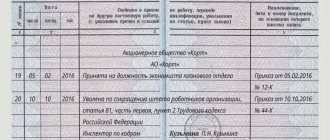13.08.2019
0
142
5 minutes.
One of the most important priorities of state policy, which is constitutionally enshrined, is the protection of motherhood and childhood. This excludes the arbitrary dismissal of a woman from the organization. However, reductions in maternity leave are permitted. A prerequisite for this is the occurrence of certain circumstances related to the suspension of the company's activities due to bankruptcy, liquidation or termination of commercial activities by an individual entrepreneur. In such situations, even maternity leave will not be an obstacle, but the employee retains the right to all required compensation, and she is warned about dismissal in advance. In other cases, even those related to reorganization, reduction is unacceptable and entails consequences for the employer.
Termination of trade agreement with an employee upon liquidation of the organization
Reference. According to the Labor Code of the Russian Federation, termination of an employment contract with a pregnant woman, as well as with a woman on maternity leave for up to 3 years, is impossible at the request of the employer.
However, if the organization or firm of an individual entrepreneur is liquidated, then the employment contract with the maternity leaver is also terminated.
Like other employees of the organization, a woman on maternity leave must be notified of the liquidation of the enterprise at least 2 months before the occurrence of this event. After termination of the contract, the employer must pay the employees severance pay in the amount of double the average monthly salary.
Features of dismissal of pregnant women
It should be noted that the legislative prohibition related to job reduction during maternity leave does not apply to situations of gross violation of discipline. Those. if the employee is convicted of:
- Appearing at work while intoxicated;
- Abuse of official position;
- Disclosure of secret commercial information;
- Misuse of the organization’s money and (or) theft;
- Immoral behavior;
- Falsification of documents.
In these cases, they may be fired, regardless of pregnancy or child care. In such a situation, dismissal is completely justified and does not entail any consequences for the employer. Similar decisions are made in case of violations of the labor regime, but only if they are systematic.
She can also resign of her own free will or by agreement of the parties; there are no legal obstacles to such an expression of will.
It is important to know! Otherwise, women on maternity leave are under state protection, and they can be dismissed only in the cases listed by law, presented below.
Can they be removed from office when moving from one maternity leave to another?
The Labor Code of the Russian Federation stipulates that while an employee is on maternity leave or child care leave, she retains her job and is paid benefits.
There are times when, while on maternity leave to care for one child, a woman learns about a new pregnancy. Then the employee is entitled to another maternity leave, but the Labor Code prohibits taking two leaves at the same time.
To get out of this situation, they usually interrupt maternity leave for the first child and replace it with labor and labor leave, after which the employee goes on another maternity leave, but this time for two children. To do this, the woman should write a corresponding statement.
The guarantees of job security in this case are the same as during the first pregnancy.
Cases from judicial practice
Russia does not have a precedent system of law . This, however, does not mean that the judge will not pay attention to the decision of another court when considering a similar case.
Therefore, even if the Labor Code does not explain some aspects of the dismissal of mothers during liquidation, their importance has already been established by the judicial system:
- You must notify in person and against signature: only a personal signature and affixed one will certify the fact of timely notification.
- A notification sent by mail without a list of attachments is not evidence of notification, because no one can accurately confirm the contents of the envelope (St. Petersburg court).
- The fact that a letter was sent is not proof of notification. If the letter is not served, then the woman cannot be fired (Omsk Regional Court).
- If a woman refuses to receive a notice and sign for it, this fact must be certified in writing. In this case, it is necessary to find 2 witnesses. For example, neighbors.
If a pregnant woman or mother is laid off before her child’s 3rd birthday, she retains her average earnings for up to three months while looking for a new job (for the same women who worked in the Far North - up to 6 months).
If staff numbers are reduced
When it comes to downsizing, the employer faces a choice:
- On the one hand, he can offer the maternity leaver another position. It must be remembered that a transfer to another vacancy will be legal only if the employee has given her written consent. It is possible to introduce a new staffing position specifically for a woman on maternity leave.
- The second possible option when reducing the number is to leave the maternity worker her place, while reducing the entire staff with the exception of a pregnant woman or a woman caring for a child.
It is important to remember that an employee cannot be fired, even if the employer did not know about her pregnancy at the time the decision to lay off was made.
If a woman, not knowing about her pregnancy, was fired, and then provided a certificate confirming her position, the employer issues an order to reinstate the employee. You just need to make sure that the gestational age indicated on the certificate confirms the “interesting position” on the date of reduction.
In cases where staff reduction has just begun, it is enough to simply cancel the reduction of the position of the pregnant employee. If a new staffing table has already been drawn up, the maternity leaver can be transferred to another position with written consent.
Legal provisions regarding the dismissal of maternity leave
Maternity leave should be understood as the period of sick leave that is given to a woman before childbirth and rehabilitation after childbirth. If you are pregnant with one child and there are no postpartum complications, this period is 140 days. After sick leave, a maternity leave is entitled to leave until the child is 3 years old, who is often mistakenly classified as maternity leave.
The Labor Code of the Russian Federation normalizes the procedure for labor relations with a woman on maternity leave based on the following articles:
| Regulations of the Labor Code of the Russian Federation | Art. Labor Code of the Russian Federation |
| General rule prohibiting dismissal during vacation | part 6 art. 81 |
| It is impossible to fire a pregnant woman | Part 1 Art. 261 |
| Possibility of dismissal of a pregnant woman | Clause 1 Part 1 Art. 81 |
| Link to possible grounds for dismissal of an employee before the child’s 3rd birthday | Part 4 Art. 261 |
| Guarantees for laid-off employees | Part 1 Art. 178 |
| Possibility, with the consent of the employee, of terminating the contract before the effective date of the notice of layoff | Part 3 Art. 180 |
In the event of bankruptcy of an organization, which may result in the dismissal of all employees (in the event of its liquidation) or a reduction in the number of personnel during bankruptcy proceedings, the conditions for the payment of severance pay and their priority are determined by Federal Law No. 127 of October 26, 2002.
Information
Social insurance issues related to maternity are regulated by Federal Law No. 255 of December 26, 2006 (clause 2, part 1, article 1.4, article 13).
When and how can a maternity leave be laid off?
A woman who is on maternity leave, as well as to care for a child under three years old, cannot be laid off. Exceptions are dismissal at the request of the employee herself, if she agrees to leave of her own free will during layoffs, or dismissal due to the liquidation of the enterprise. These rights are guaranteed according to Art. 261 Labor Code of the Russian Federation. Let's consider how an employee of an organization who is on leave to care for a minor child can be legally laid off.
Read about whether it is possible to lay off a woman with a child under 3 years old here, and from this article you will learn about whether a worker on maternity leave can be fired.
Due to the liquidation of the company
Liquidation of an enterprise involves the complete cessation of its activities. To do this, the company is excluded from the Unified State Register of Legal Entities, the liquidation is reported to the tax authorities, the pension fund and the Social Insurance Fund, and the public is also notified by publishing a message in the press. In other words, this is a long and complex process.
On a note. No less labor-intensive is the reduction of employees of a liquidated company. The complete cessation of a company's activities means the termination of labor relations with all its employees. This also affects preferential categories of employees, since the company cannot provide them with other jobs.
The procedure for reducing employees during liquidation is as follows:
- The management of the enterprise sends a notice of liquidation of the company to the employment service.
No later than two months before dismissal, it is necessary to notify employees in writing and with a personal signature of the upcoming layoff due to liquidation.The text of the notification must indicate the specific date of termination of employment contracts; it also informs when employees should contact the HR department to obtain work books and other documents.
The notification must be in writing, since oral communication of information is unacceptable for the reason that it does not have legal force, that is, it cannot act as evidence of compliance with the necessary procedure.
The notice is drawn up in two copies: one is given to the employee, and the second with the recipient’s signature remains in the personnel service.
- Management issues a dismissal order and makes it available to employees for review.
- The final calculation and payment of compensation to employees required by labor legislation is made (you can find out what compensation is due upon dismissal if the employee was on maternity leave, as well as how to calculate the amount of payment, here).
- The dismissed employee is given all the necessary documents.
In the case of a maternity leave, this is:- work book (with the wording “dismissed due to the liquidation of the organization, clause 1 of article 81 of the Labor Code of the Russian Federation”);
2-NDFL certificates;
- copies of sick leave;
- applications for leave.
Note! To process the necessary payments, the employment and social protection service will also require copies of orders confirming the fact of work at this enterprise, transfers made and dismissal.
The photo below shows a sample of filling out a work book for an employee on parental leave during the liquidation of an enterprise:
In what cases is dismissal illegal?
Can they legally be laid off while on maternity leave? Unfortunately, this issue is relevant in the modern world and requires special attention in each specific case.
When reorganizing a company
During maternity leave, significant changes may occur in the company in which the young mother worked.
They may be caused by a change in the organizational form of the enterprise:
- connection of several divisions;
- merger;
- selection;
- separation;
- transformation.
Such an inversion often introduces organizational changes, adjustments to job responsibilities, composition and size of the workforce. At the same time, the reduction of maternity leave while reducing the number of staff is illegal and protected by law.
In addition, the reorganization of an enterprise is not a basis for terminating a trade agreement with employees, except in the case where the hired persons themselves refuse to work in the new organization. Article 261 of the Labor Code of the Russian Federation strictly prohibits the termination of employment contracts with women with children under three years of age.
Attention: It is mandatory to make an entry in the work book about the reorganization of the legal entity with reference to the corresponding decision of the director (Rostrud letter No. 1553-6 dated September 5, 2006).
Other cases
Also, the employment relationship can be terminated with a young mother if she herself expresses a desire to quit. In this case, the employee must write a written application addressed to the organization’s management, who must affix her visa.
On the last working day, the employee must be given a paycheck for the time worked and unused vacation, as well as a work book.
Also among the legitimate reasons for dismissal may also be:
- expiration of the term of validity of an urgent TD;
- confirmation of the employee’s inability to work, which is proven by medical certificates and reports;
- subject to administrative or criminal punishment, excluding the opportunity to engage in a specific type of activity if it is part of the employee’s job duties.
There are no other cases provided for by law and dismissal actions will be considered illegal.
What payments does a woman with a child under 3 years old receive?
A woman while on maternity leave receives the following payments:
- Maternity benefit.
- One-time benefit for the birth of a child.
- Monthly transfers until the child reaches 1.5 years of age.
If an employee provided sick leave for maternity leave before her dismissal, the employer pays for it in full. The amount of the payment is the average earnings for the same period (140 days for a singleton pregnancy and 194 for a multiple pregnancy). In addition, women dismissed due to the liquidation of an enterprise can apply for this benefit within a year after their dismissal.
After an employee is laid off, a lump sum allowance for the birth of a child and a monthly allowance for child care up to 1.5 years will be paid by the territorial social welfare service.
According to current legislation, in case of layoffs due to liquidation, all dismissed employees have the right to severance pay , which is 2 average monthly earnings.
In addition, if a dismissed maternity leave person contacts the employment service and confirms that she was not employed within 2 weeks from the date of dismissal, then she has the opportunity to receive payments for another month.
Thus, a woman on maternity leave after being dismissed due to the liquidation of an enterprise can receive compensation in the amount of 3 monthly earnings.
However, it should be noted that if a woman registers with the employment center after her dismissal, she will be granted unemployment benefits. Since it is impossible to receive two benefits at the same time, she is no longer entitled to a monthly child care allowance.
On a note. The continuation of child care benefits depends on the further actions of the employee dismissed due to the liquidation of the enterprise. If a woman enters into an employment contract with a new employer, then payments will be made at the new place of work.
If a woman registers with the employment center, she receives unemployment benefits, and child benefit payments are stopped. If a woman remains unemployed, then child care benefits are paid to her by social protection authorities.
What to do if management insists on layoffs?
We have considered all cases related to the topic of whether it is possible to reduce the position of a maternity maid during maternity leave. Every employer should remember that women caring for children under three years of age are a preferential category and have some guarantees, namely, the prohibition of deprivation of employment except for liquidation.
All processes must be carried out within the framework of the law; if violations are discovered, an application should be immediately filed with the competent authorities.
Contacting the labor protection service
The text of Article 392 of the Labor Code of the Russian Federation explains that each staff unit has the right to apply for resolution of disputes about non-compliance with the legal order within 1 month from the date of receipt of the notice or order of dismissal.
The labor inspectorate will help restore justice and protect the rights of every worker. A written application must be submitted, on the basis of which an inspection of the enterprise will be organized within a month.
If violations are detected, the inspector will take the following actions:
- will issue an order to the director to eliminate violations;
- will bring the violator to administrative responsibility.
Important: As a mandatory requirement, there may be a clause regarding the mandatory reinstatement of an unfairly dismissed employee.
Arbitrage practice
In case of illegal dismissal, a female employee can appeal the manager’s actions in the courts, presenting evidence of violations of rights. Based on all the materials provided, the court will make a decision.
Often the court takes the side of the dismissed employee. When satisfying the plaintiff’s demands, the court sets a number of mandatory requirements:
- reinstate an illegally dismissed employee;
- pay for forced absences;
- satisfy demands for material compensation;
- compensate for moral damage caused.
The expenses incurred during the litigation must be compensated by the head of the company. Bailiffs also monitor the execution of the decision.
If a woman is sure that she was fired illegally, nothing prohibits her from contacting several authorities at once for efficiency.
What are the consequences of wrongful dismissal for management?
In case of illegal dismissal of a pregnant woman or maternity leave, officials may be held legally accountable based on the results of the inspection.
The punishment directly depends on the nature and severity of the violations committed by the boss:
- warning;
- administrative fine for the head of the company 1000 - 5000 rubles in accordance with Article 5.27, part 1 of the Code of Administrative Offenses;
- suspension of the organization in question for up to 90 days;
- a fine of up to 200 thousand rubles or in the amount of salary for 1.5 years of work of an unfairly dismissed employee (Article 145 of the Criminal Code of the Russian Federation);
- corrective compulsory labor for up to 15 days.
The manager will also need to compensate the moral damage caused to the employee. The exact amount in monetary terms is indicated in the concluded employment agreement or in a court order.
Thus, there are not many ways to lay off a pregnant employee or fire an employee during maternity leave. If the company is not subject to liquidation, it is better not to take risks and let the young mother return to her workplace after maternity leave.
Tags: maternity leaveDismissal
Is it possible to make redundancies when an employee returns from vacation?
According to a woman with a child under 3 years of age, she has the right to go out and work full-time, but at the same time losing the opportunity to receive state benefits, or work a certain number of hours a day, possibly even at home (subject to conditions), having the right to benefits (Labor Code of the Russian Federation, Art. 256).
Upon returning from maternity leave, regardless of the chosen work schedule, it is impossible to lay off a woman until the child reaches 3 years of age. But a maternity leaver who interrupts her vacation is subject to dismissal for guilty offenses provided for by the Labor Code of the Russian Federation (Article 81). Such acts include:
- being at the workplace and during working hours in a state of intoxication caused by alcohol, drugs or toxic drugs;
- absenteeism;
- failure to pass certification;
- repeated failure to fulfill job duties without good reason (if there is an outstanding disciplinary sanction);
- disclosure of trade secrets;
- violation of occupational safety and health regulations;
- guilty actions if an employee directly serves monetary or commodity assets, if they give grounds for loss of confidence in him by the employer;
- immoral actions of an employee whose duties include educational functions;
- forgery of documents when applying for a job;
- theft, illegal spending of funds, deliberate damage to property.
Attention
In cases of theft and other illegal actions, it is necessary to have a court verdict or a decision of a judicial body, a person authorized to consider cases related to administrative offenses.
Notification of a reduction in the employee's rate in the staffing table
A notice of reduction is a document, the text of which indicates information about the reduction of a position in an organization. It can be given to a maternity leaver with an offer to take a new position. Even if the employee received such a notice and this fact is confirmed, she cannot be fired due to a reduction in her position. With written consent, an employee can be transferred to another position.
Notice of layoffs must be provided in writing - it can be delivered to the organization in person or sent by registered mail.
The notification must be drawn up in two copies:
- one is given to the employee;
- the second with the recipient’s signature remains in the personnel department.
Is it possible to fire a woman who is on maternity leave?
Maternity leave is called leave to care for a child; its duration is up to 3 years.
The period for providing monthly benefits is limited to up to 1.5 years. It is one and a half years out of three provided as part of maternity leave that are counted in the insurance period for the assignment of a future pension.
Leave to care for a child until he reaches the age of 3 years is a state guarantee for every woman who gives birth, as well as:
- the child's father;
- grandmother;
- grandfather;
- other relatives or guardians who actually care for the child.
Article 256 of the Labor Code of the Russian Federation guarantees the retention of a position and average monthly earnings, and this period is also counted in the total length of service and work experience in the specialty. Although the legislation of the Russian Federation does not provide for an official extension of maternity leave, it is possible to extend it in the following ways:
- go on regular leave by agreement with the employer immediately after maternity leave;
- become pregnant with another child and thereby extend maternity leave to 6 years;
- issue a sick leave certificate for medical reasons if the child needs medical care and care.
The law prohibits an employer from laying off employees and employees on maternity leave on their own initiative, including through layoffs. The only exception is the liquidation of an organization or termination of the activities of an individual entrepreneur. In all other cases, being registered with an organization during the period of child care is a guaranteed right (read about the legal grounds for layoffs and how to reduce the risk of dismissal here)
An employee on maternity leave can, at her own request, go to work part-time, remotely, and also receive child care benefits. In this case, it is impossible to dismiss her due to reduction while she is on maternity leave, even though she works part-time. Find out which employees cannot be laid off according to the law, and who has a preferential right.
Also, a woman on maternity leave can go back to full-time work, interrupting her maternity leave and thereby losing her right to benefits.
However, it is still impossible to fire an employee with a child under 3 years old, even if she returns to work (Article 261 of the Labor Code of the Russian Federation).
There are exceptions in this case:
- failure or improper performance by the employee of her duties;
- showing up at work while intoxicated;
- disclosure of trade secrets;
- identification of facts of theft, misappropriation of money;
- falsification of documents;
- systematic violation of the work regime;
- gross violations of official duties.
If such facts are established, the mother of a small child may be fired.
Legislative regulation of the issue
Women at any stage of pregnancy or mothers caring for children are among the most vulnerable category of Russian citizens.
For this category, the legislation establishes a number of privileges and benefits that are aimed at protecting professional interests:
- According to the content of Article 256 of the Labor Code of the Russian Federation, during the period of maternity leave, maternity employees are guaranteed the retention of their position, average monthly earnings, as well as the responsibilities enshrined in the agreement on bilateral cooperation.
- In accordance with Article 261 of the Labor Code of the Russian Federation, it is under no circumstances allowed to terminate an employment agreement with a woman who has children under 3 years of age.
- The Order of the Ministry of Health and Social Development dated December 23, 2009 clearly establishes the amount and timing of the due payments.
- The content of Article 5.27 of the Code of Administrative Offenses of the Russian Federation describes liability for violations of labor protection requirements and labor legislation.
Important: Any unlawful actions of the boss can be appealed in court. After the investigation, the maternity leaver must be reinstated in her position, and preventive measures must be taken against the manager.
Women's rights on maternity leave
According to the legislation of the Russian Federation, it is prohibited to dismiss an employee on the initiative of the boss if he is temporarily disabled or on vacation.
Also, termination of TD is unacceptable in the following cases:
- the woman is pregnant;
- An employee is raising a child under 3 years old;
- the employee has 3 or more children, and the second parent has no income;
- the employee is a single parent raising a child under 14 years of age;
- The young mother is dependent on a disabled minor child.
The law will not be able to protect a woman in the event of serious labor violations (Article 81 of the Labor Code of the Russian Federation):
- going to work while drunk;
- abuse of official duties;
- disclosure of trade secrets;
- identification of facts of theft, misappropriation of money;
- committing an immoral act;
- falsification of documents;
- systematic violation of labor regulations, etc.
In this case, she will be fired, despite her position.
Reduction of maternity position
According to Article 261 of the Labor Code of the Russian Federation, the management of an enterprise does not have the right to reduce a maternity position until the employee’s child reaches the age of three years.
If for some reason management decides to review its staff and the job of a disabled employee must be reduced, then management must notify the woman at least 2 months in advance and provide her with vacant jobs with the same salary and work schedule. She has the right to refuse vacancies if they do not suit her for any reason.
In any case, dismissal will not occur before the time when the employee returns to work from maternity leave. If an employee returns to work prematurely from maternity leave, her layoff will not occur until her baby turns three years old.
Reduction procedure: step-by-step instructions
The procedure for dismissing a maternity worker during staff reduction is regulated by law and includes several mandatory steps. The layoff procedure itself takes at least two months - it is precisely this period of time before the date of dismissal that the employer is required to notify the employee of the upcoming severance of the employment relationship.
In the event of liquidation of an enterprise, you can begin the process of preparing documents for layoffs at any time during parental leave. If the reduction is made in connection with the reorganization of the enterprise, it is permissible to prepare documents and serve notice on the employee two months before the end of maternity leave.
For example, if an employee’s baby is two years and ten months old, the employer can send her a layoff notice and then fire her two months later. This course of action will be absolutely legal.
Notification is not the only document that is required to carry out the reduction procedure. The complete algorithm looks like this:
- A commission consisting of several employees is created. The basis for organizing a commission is an order signed by the head of the company. The commission’s task is to prepare a list of employees who will be laid off. In the event of liquidation of the enterprise, the entire staff of the company will be on the list. During reorganization, the list is compiled taking into account the employee’s preemptive right to retain his workplace. This right includes maternity leavers, single mothers and parents of disabled children. Based on the results of the discussion and preparation of the list, another order is drawn up - on staff reduction.
- Each employee included in the layoff list must receive notification no later than two months before the date of dismissal. The period is the same for all categories of employees, including those on parental leave. Receipt of the notification is confirmed by the signature of the employee.
- Prepare and publish a dismissal order. For each employee, a separate document is drawn up, which indicates the date and reason for termination of the contract, as well as an indication of the article of the Labor Code of the Russian Federation and the details of the order to reduce staff.
- The final stage is the delivery of a work book to the dismissed employee. This operation is carried out on the day of dismissal specified in the notice. The work book must be filled out correctly: the dismissal record must include the order number, a reference to the law and the reason for dismissal. The delivery of the book is recorded - the employee must document receipt of the document by signing in the work record book.
And also on the day of dismissal, the employer is obliged to give the dismissed maternity leave a full monetary payment.
Basic mistakes
The main mistake employers make when laying off a temporary employee is considered to be ignorance of the fact that the labor rights of such an employee are full, like those of other categories. There are also several rules that are not followed, leading to the possibility of appealing the dismissal. List of rules:
- the reduction of a temporary employee is impossible if the main employee is considered a benefit recipient, since a number of categories can be reduced only with complete liquidation;
- if a temporary employee is himself a benefit recipient, then, on general grounds, he also cannot be laid off;
- temporary employees receive all payments that are identical to other categories upon reduction. This includes not only basic payments, but also additional ones, which are provided for by various agreements and agreements, including collective ones;
- Notification of a temporary employee is made depending on the type of reduction and the version of his employment contract. Notifications should be provided to him on the same terms as other workers;
- A temporary worker has the right to vacant positions and, in case of refusal, must submit a written application.
If an employer violates the rights of a temporary worker, he can be reinstated in the workplace through the court, since the layoff is carried out according to general rules, which means full protection of labor rights and guarantees.
The reduction of a temporary employee is carried out according to the general rules established. When dismissing such an employee, the employer must first check the possibility of reduction, since preferential categories, for example, in a maternity position, cannot be reduced. The layoff procedure has a standard form with notification and the possibility of transfer to a vacant vacancy. If the employer has violated the rights of a temporary worker, the employee has the right to appeal to the labor inspectorate or court.
Grounds for dismissal
In conditions of staff or position reduction, the citizen remains in the company structure. This is a mandatory legal requirement. Even if the term of the employment agreement has expired, it is automatically extended until the end of maternity leave.
Exceptions to the rules depend largely on the actions of the woman herself. There are several regulatory positions that allow you to fire her:
- The mother's decision to leave her place of work . A statement of mutual agreement is written or the desire of the employee herself is specified.
- Final closure of the enterprise . Then the reduction occurs in all areas of the company’s activities and only the complete closure of the organization is considered.
- Guilty actions of the employee . These include situations that occurred during labor and related to offenses under Article 81 of the Labor Code of Russia. This could be a gross violation of duties, disclosure of secrets, or theft.
It is possible to fire a woman who is on maternity leave, but there is a set of specific grounds for this. Not every procedure falls under such clauses. And in any case, there are options to challenge the employer’s decision.








